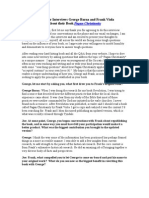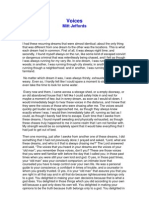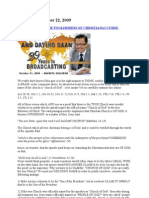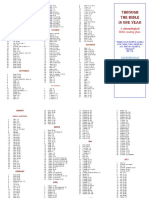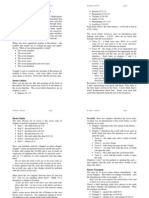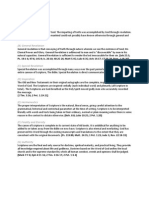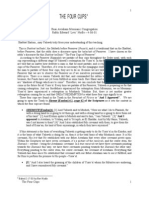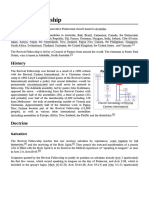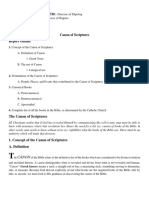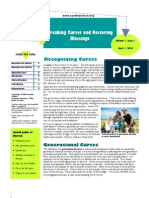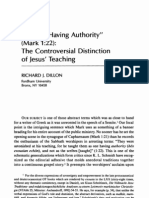Didache
Didache
Uploaded by
Dave GokCopyright:
Available Formats
Didache
Didache
Uploaded by
Dave GokCopyright
Available Formats
Share this document
Did you find this document useful?
Is this content inappropriate?
Copyright:
Available Formats
Didache
Didache
Uploaded by
Dave GokCopyright:
Available Formats
DIDACHE
Didache
INTRODUCTION
About This Book
The Didache is an early Christian composition containing instruction for early Christian churches.
Considered once lost to history, the Didache was recovered in 1883 by Philotheos Bryennios, a
Greek Orthodox metropolitan archbishop, in the Greek Codex Hierosolymitanus (also known as
the Jerusalem Codex) written in 1053. The Jerusalem Codex also contains the works of early
church fathers such as Barnabas, Clement, and Ignatius of Antioch.
As we know it today, the Didache reads as an eclectic writing of different parts, or layers, believed
to have been written separately, and then later combined. Because the four primary parts take on
different writing styles, it is somewhat of a puzzle if four different authors were involved, or if there
were fewer authors who later redacted their own compositions from different time periods.
The Didache is dated approximately 49-79 AD, before Johns Epistles, the book of Revelation,
and possibly many other New Testament books were written. The earliest layers of the Didache
may have seen their origin during the time of the Jerusalem Council (around 50 AD), and may
have played a role in the controversy surrounding the Gentiles (Acts 15). If this is the case, then
the Didache may have been a collaborative work of some council members as a proposed draft
for the letter to the Gentiles (Acts 15:22-29). This seems to be supported by the key points made
in Chapters 1-6, which elaborate on the more simplified points that were made in the actual letter
sent out. Some instruction (4:8, 6:3, 8:8) also appears to overlap with events in early chapters of
Acts (see cross-reference legend). Finally, there is some terminology used in tandem with events
occurring in the time of Acts, such as your servant, Jesus (9:3, 9:5, 10:3), and one use of the
term Christian (12:4).
Because the Didache references the existence of at least one gospel (8:2), parts of it were likely
written after the Gospel of Matthew. It also contains an almost identical version of the Lords
Prayer from Mat 6:9-13 and several passages identical in grammar to Matthew (compare 1:7 to
Mat 5:42). It is difficult to determine, however, whether these passages originated in the book of
Matthew, only to be later copied into the Didache, or vice-versa. A third possibility exists that both
Matthew and the Didache copied these passages from the largely speculated Q manuscript, a
hypothetical composition of Jesus sayings believed to include both of these passages, and
others.
Author and Purpose
The Didache uses strong Jewish language, such as the prevalent two paths theme. The authors
also express their knowledge of Jewish days of fasting and preparation day of the Sabbath (8:1),
suggesting they were converted Jews. The word used to describe the manuscripts target
audience is eqnesin and can be translated as the nations, however the Apostle Paul also used
this word when addressing the gentiles. If the Didache was targeted specifically to the Gentiles,
its purpose was initially to indoctrinate them with many practices of the Christian Jews.
It is likely, however, that the Didache was adapted to address all churches to read as a general
teaching about Christian living. In a time where only one gospel likely existed and many apostolic
texts had not yet been written, this text would provide a basic blueprint to follow for many rural
communities, some which apparently lacked even a basic church leadership (13:4).
While the actual author (or authors) is left to speculation, some clues suggest that he may have
been a direct disciple of Jesus, or possibly the understudy of an apostle. The author shares in
DIDACHE
Jesus strong opinions of the Pharisees as hypocrites (8:1), and is confident enough in the
authority of their manuscript to call anyone who teaches otherwise perverse (11:2). The author
also had somewhat intimate knowledge of either the Gospel of Matthew, or Q, for reasons already
mentioned. Moreover, the reference to the feeding of the 5,000 (9:7) is cited as if the author was
present during this event. All of these suggest a relatively close relationship to either Jesus or an
apostle.
Structure
The Didache can be divided into four main parts:
The first section (Ch. 1-6) elaborates on the two greatest commandments as given by Jesus, to
love your God, who created you, and your neighbor as yourself. Basic instruction for Christian
living is presented here as if a teaching from the Lord. This first section is believed, by some, to
be a heavily edited version of a Jewish tract entitled, The Two Ways, which served as a
handbook for Jewish converts in the Synagogue, however no such document predating the
Didache has yet to be found, and this is merely speculative.
The second section (Ch. 7-10) deals with common church practices such as that of baptism and
communion (the Eucharist). In this section, many prayers likely used in the early church are
documented, including the nearly identical version of the Lords Prayer from Mat. 6:9-13.
The third section (Ch. 11-15) deals specifically with ministry and how to deal with itinerant
ministers, identify false prophets, and care for the needs of permanent leadership. A strong
emphasis is made with respect to the authority of prophets, apostles, and teachers (see note on
11:2). It is evident from Ch. 15 that the audience included small communities, many of which must
have had to, under the instruction given, form their own elder and deacon leadership.
The fourth and final section (Ch. 16) provides a brief apocalypse, with striking similarities to that
in Mat. 24.
Scriptural Authority
The Didache was accepted by many early church fathers as scriptural. Among these were
Athanasius, Rufinus, and John of Damascus. The book was also accepted into the Apostolic
Constitutions Canon 85 and the 81-book Ethiopic Canon. It was rejected, however, by
Nicephorus, Pseudo-Anastasius, and the 60 Books canon. Many early authors including
Barnabas, Irenaeus, Clement of Alexandria, and Origen quote or reference the Didache.
Acknowledgements and Notice of Copyright
Translated by Jonathan A. Zdziarski from the Funk/Bihlmeyer 1924 Greek critical text
Copyright 2006 by Jonathan A. Zdziarski
Permission granted to redistribute, in original form, for academic or noncommercial purposes only
All other rights reserved
DIDACHE
The Lords Teaching Through the
Twelve Apostles to the Nations
1 There are two paths; one belongs to
life and one to death, but there is much
difference between the two paths. 2The
path of life is surely this: first love your
God who created you. Next, your
neighbor as yourself. And all things that
you would not want to happen to you,
likewise do not do to others. 3Now the
teaching of these words is this: Bless
those who curse you and pray for those
who hate you. Moreover, fast also for
those who persecute you. 4For to what
favor is it to love those who love you?
Do not even the sinners do this? But love
those who hate you and you will by no
means have an enemy. 5Abstain from
sensual and bodily desires. 6If anyone
strikes you on the right cheek, turn him
your other, and you will be complete; if
anyone presses you to go a mile, bring
him two; if anyone takes away your
cloak, give him your coat as well; if
anyone takes anything from you that is
yours, do not demand it back, for neither
have you been able to. 7Give to all who
ask of you, and do not demand back, for
it is the purpose of the father to be
giving by means of our own blessings.
8
Blessed is he who gives according to
this command, for he is blameless. 9Woe
to them who take, for in fact he who
receives in need is without penalty, but
1:4 favor. Grace or kindness.
1:7 ask. Also demand or beg.
1:8 blameless. Without guilt or penalty. Not in
the sense of one without sin, but in the sense of
one who is upright.
1:9 penny. Farthing; a coin worth about threeeighths of a cent.
he who receives without need shall bring
forth judgment, of why and of what was
taken. And being thrown in prison, he
shall be examined concerning his deeds,
and not let go from that place until he
pays back the last penny. 10Nevertheless,
concerning this moreover, it has been
said, Let your alms sweat in your hand
until you know to whom you should
give.
2 And the second command of this
teaching: 2Do not murder. Do not
commit adultery. Do not seduce
children. Do not fornicate. Do not steal.
Do not practice magic. Do not practice
sorcery or witchcraft. Do not murder
children in abortion, nor kill that which
is born. 3Do not covet your neighbors
possessions. Do not swear falsely. Do
not bear false witness. Do not speak ill
of others. Do not bear a grudge. 4Do not
be double-minded or deceitful, for deceit
is a snare of death. 5Do not let your
words be false, nor empty, but according
to deed. 6Do not be greedy, nor a thief,
nor a hypocrite, nor malicious, nor
arrogant. 7Do not take up counsel against
your neighbor. 8Do not hate others,
nevertheless some you will certainly
reprove, and concerning some you will
pray, and some you will love above your
own life.
1:10 alms. A charitable gift to the poor.
2:1 seduce children. Engage in sexual relations
with.
2:4 deceitful. Lit. double-tongued; saying one
thing to one person and another thing to the
other.
2:8 reprove. Lit. put to shame.
DIDACHE
3 My child, keep from every evil work,
and from every likeness of it. 2Do not be
inclined to anger, because anger leads to
murder. Moreover do not be envious,
argumentative, or hot-tempered for from
all of these murder is born. 3My child, do
not be lustful, for lust leads to
fornication. Neither use obscene
language, nor have lofty eyes, for out of
these adultery is born. 4My child, do not
be a partaker in omens, as this leads to
idolatry. Neither be a fortune-teller, nor
an astrologer, nor a purifier; neither
purpose to see or hear them, for out of
all these idolatry is born. 5My child, do
not be a liar or cheat, for fraud leads into
theft. Be neither a lover of money, nor
given to vain imagination, for out of
these theft is born. 6My child, do not be
a grumbler, for this leads to blasphemy.
Do not be stubborn or evil-minded, for
out of these blasphemy is born. 7But give
yourself to a gentle spirit, because the
meek will inherit the land. 8Be longsuffering, merciful, innocent, have a
quiet disposition, and be gentle, and
tremble with fear at every word you
have heard. 9Do not exalt yourself or
give your soul over to recklessness. 10Do
not join your soul together with the
world, but dwell among the righteous
and humble. 11Come to accept
everything that happens to you as good,
3:3 obscene language. Filty language.
3:4 idolatry. Lit. idol worship. fortune-teller. Lit.
enchanter; worker of charms.
3:9 recklessness. Insolence; over-boldness. give
your soul over. Lit. give the soul your insolence.
4:6 have much. To hold; used here to denote
possessions or riches. Similar to echthv (man of
substance). through your hand. Likely talking
about through receiving help, as received by the
stretching out of the hand in v.5, or care (as in
Luk 23:46) used throughout the NT in the laying
knowing since without God nothing
would come to be.
4 My child, remember night and day he
who speaks the word of God to you, and
honor him as the Lord. For wherever the
Lords own speak, the Lord is present.
2
Moreover, seek out through the day the
faces of those who are devoted to God,
so that you may rest upon their words.
3
Do not cause division, but live
peaceably with those being contentious.
Judge righteously, not showing
favoritism in rebuking for sin. 4Do not
be double-minded, wondering what will
or wont happen. 5Do not be one who
stretches out your hand to receive the
help of others, and then one who draws
it back to give. 6If through your hand
you have much, give recompense for
your sins. 7Do not hesitate in your
giving, or grumble when you give, for
you shall know the one who is the good
giver of rewards in return. 8Do not
abandon those in need, but share in all
things with your brothers in Christ.
Moreover, do not call anything your
own, for if you are partakers in that
which is incorruptible, how much more
in that which is corruptible? 9Do not
remove your hand from your son or your
daughter, but teach them the fear of God
from their youth.
on of hands or to uplift. Could also mean work of
your hands (labor), however this is typically only
found in the NT when accompanied by the Greek
ergon (work; business). In the context of v.5 and
v.7, this would mean to receive help from others
when you already have much from your own
labors, or to have much from your own labors,
but unwilling to help those in need. In all cases,
the point made is that all are sin, and stresses that
giving is an appropriate recompense.
DIDACHE
10
Do not command your slave or maidservant, whose hope is in the same God,
in your bitterness, lest they might no
longer fear God who is over you both;
For He comes not to call those according
to appearance, but those whom the spirit
has made ready. 11Slaves, be subjected to
your master as an example of God, in
humility and fear. 12Detest all hypocrisy
and all that is not pleasing to the Lord.
13
Do not in any way forsake the Lords
commands, but keep what you have
received, neither adding to or
diminishing them. 14Openly confess your
sins in the church assembly, and do not
take to prayer with an evil conscience.
15
This is the path of life.
5 But the path of death is this: first,
everything is wicked and full of curses,
murder, adultery, lust, fornication, theft,
idolatry, sorcery, witchcraft, marauding,
false witness, hypocrisy, doublemindedness, deceit, haughtiness,
depravity, stubbornness, greediness,
obscene language, envy, insolence,
loftiness, and boastfulness - without any
fear. 2Persecutors of the upright, hating
the truth and loving a lie; not knowing
the reward for righteousness, nor
clinging to what is good nor to righteous
judgment; longing not for that which is
good, but for that which is evil, from
whom gentleness and patience are
distant; loving vanity, pursuing
4:14 church assembly. A corporate assembly; the
church not just the leadership, but all believers.
5:1 without any fear. The individuals who do
these things have no fear of God. This might be a
list of offenses against God, illustrating how one
sin leads to another, suggesting the root of all
these begin with abandoning the fear of God; an
illustration of the escalation of sin and apostasy,
eventually leading to murder.
7:1 natural flowing water, Active, running,
moving, fresh water; like that of a stream; some
retribution, without compassion for the
afflicted or needy, not troubled by the
oppressed, not knowing Him that made
them; murderers of children, destroyers
of the work of God, turning away from
the needy, oppressing the distressed,
advocates of the rich, judges of the poor
and destitute altogether sinful. 3Be
delivered, children, from all of these
things.
6 Take heed, lest one lead you astray
from the path of this teaching, for he
teaches apart from God. 2For, if you are
able to take up the whole yoke of the
Lord, you will be complete, but if you
are not able, do that which you are able.
3
And concerning your food, bear what
you are able, but keep far from that
which is sacrificed to idols, for it is the
worship of dead gods.
7 Now concerning baptism, in this way
baptize, having said all of these things
beforehand: baptize into the name of the
Father and of the Son and of the Holy
Spirit in natural flowing water. 2But if
you dont have natural flowing water,
baptize into some other water; and if you
are not able to in cold, then in warm.
3
Moreover, if you dont have either, then
pour out the water onto the head three
times, into the name of the Father and
the Son and the Holy Spirit.
translate this as living water, but this is incorrect
as v.3 insists this verse is about submersion vs.
pouring. cold. Again suggesting the intended
subject as a stream. into the name of See Mat
28:19.
7:2 other water. Or drinking water. In many
geographical areas, streams may not have been
prevalent, but only water from a well or bath.
7:3 either if a stream, or any other form of
submersion is not available. onto the head. Like
anointing oil (See Exo 29:7)
DIDACHE
But before the baptism, let the one who
baptizes and the one being baptized fast,
and whoever else is able. But give time
to the one being baptized to fast for one
or two days before.
8 Moreover, do not let your fasting be
with the hypocrites. For they fast on the
second and fifth day of the week, but
you fast on the fourth and preparation
day. 2Neither pray like the hypocrites,
but as the Lord has commanded in His
Gospel. In this way pray:
Our Father in heaven,
hallowed be your name,
3
your kingdom come,
your will be done
on earth as it is in heaven.
4
Give us today our daily bread.
5
Forgive us our debts,
as we also forgive our debtors.
6
And lead us not into temptation,
but deliver us from the evil one.
7:4 give time to. Can also mean urge,
recommend, or order. Use of order here isnt
likely, however, as the scriptures make no such
prerequisite to be baptized. It is more likely that
this developed as a voluntary practice in order to
allow the believer time to pray and understand
the significance of baptism, and their new life in
Christ, and to give others time to intercede on his
behalf (see Luk 1:10). one or two days before
due to the emphasis on time, the most likely use
of the word here is probably urge and allow time
for.
8:1 hypocrites. Pretenders or actors; the
Pharisees (see Mat 23:13-29, 6:2,5,16, 6:16).
Pharisees were instructed by the Talmud to fast
on Mondays and Thursdays; some believe this
term is used to address early church prejudice
against all Jews, but this is disagrees with Jesus
use of the word in Mat. preparation day. Friday,
the day of preparation before the Jewish Sabbath.
8:2-8:7 In this way pray The Lords Prayer
here is cited almost identical to Mat 6:9-13, with
the addition of v.7.
For yours is the power and the glory
forever.
Three times daily, in this way pray.
9 Now concerning the Holy
Communion, in this way give thanks.
2
First, concerning the cup:
We give thanks to you, our Father,
for the holy vine of David, your servant,
3
which you made known to us through
your servant Jesus,
4
yours is the glory forever.
5
And concerning the broken bread:
We give thanks to you, our Father,
for the life and knowledge
which was made known to us through
Jesus your servant.
6
Yours is the glory forever.
7
Even as that broken bread was scattered
among the hills and gathered,
8:8 three times daily. See Act 3:1, 1The 5:17-18.
Instruction to Christians concerning this in the
New Testament was pray without ceasing.
Orthodox Jews were required to pray three times
daily; v.2 suggests some early Jewish converts
may have also fallen under this compulsion; In
the context of v.1-2, this clearly was not intended
to place the yoke of the law onto the backs of
Christians, but to emphasize the importance of
prayer.
9:1 Holy Communinion. The rite of the
Eucharist; some early church fathers used the
term Eucharist to describe both the rite of
communion as well as the consecrated elements
(the wine and unleavened bread), while others
use the term Eucharist only to address the
elements, and not the rite. The word literally
translates as thanksgiving, so anything more than
this is a substitution for the sake of convenience.
9:2-9:8 concerning the cupbread Much like
The Lords Prayer, this is not necessarily a
prescribed verbatim prayer, but a pattern to
follow.
DIDACHE
in this way gather your church
from the ends of the earth
into your kingdom.
8
For yours is the glory and the power
through Jesus Christ, forever.
9
But dont let anyone eat or drink of
your sacrament unless they have been
baptized in the name of the Lord. 10For
concerning this the Lord has said, Do
not give that which is holy to dogs.
10 And after you are filled, in this
way give thanks:
2
We thank you holy Father
for your name,
which you have made to dwell
in our hearts,
3
and for knowledge, and faith,
and immortality,
which has been made known to us
through your servant Jesus.
4
Yours is the glory forever.
Remember now, Lord, your church;
to deliver her from all wickedness
and perfect her in your love,
10
and gather her together
from the four winds,
sanctified for your kingdom,
which you have prepared for her,
11
for yours is the power and the glory
forever.
12
Let grace come forth
and this world pass away.
13
Hosanna to the God of David!
14
If anyone is holy, let him come forth,
if anyone is not, let him repent.
15
Come, Lord! Amen.
16
But permit the prophets to give thanks
as much as they desire.
11 Whoever, consequently, might
You, sovereign Lord, created all things
for the sake of your name,
6
not only giving food and drink
to man for enjoyment
that they might give thanks to you,
but have freely given us spiritual food,
and drink, and everlasting life
through Jesus your servant.
7
Before all things we give thanks to you
because you are mighty.
8
To you be the glory forever.
come and teach you all of these things
which have been said before - receive
him. 2But if the teacher himself, being
perverse, teaches another teaching to
diminish this, do not hear him; yet if he
increases righteousness and the
knowledge of the Lord, receive him as
the Lord. 3Moreover, concerning
apostles and prophets, act according to
the command of the Gospel. 4But every
apostle coming to you shall not remain
more than one day, or another if
necessary, but if three days, he is a false
prophet.
9:7 that broken bread. Or this. Probably a
reference to Mat 14:13-21
9:9 unless baptized. As baptism is an outward
profession of faith and occurred soon after
salvation, it is urged that only those believers
partake in communion to keep it sacred (v.12),
possibly too for the sake of the believer (see 1Co
11:27-30). do not give to dogs (see Mat 7:6)
10:1 in this way. See note on 9:2
10:15 come, Lord! Marana tha.
11:2 perverse. Anyone teaching a doctrine
contradicting this is said to be perverse. receive
him as the Lord. Places a strong emphasis on the
authority of those sent by the Lord, as ones with
a direct word from the Lord. This does not
suggest superiority, but as the Lords delegates,
the treatment bestowed upon them will be as if
upon the one who sent them. (See: Joh. 12:44,
Mk. 12:1-9)
11:4 every apostle. Itinerant ministers; not the
DIDACHE
And upon departing, let the apostle take
nothing but food, until he finds shelter.
Moreover, if he calls for money, he is a
false prophet. 6And for every prophet
who speaks in the spirit - do not try nor
judge, for each offense will be forgiven,
but this offense will not be forgiven.
7
And not everyone who speaks in the
spirit is a prophet, but only if he has the
ways of the Lord. 8From his ways the
false prophet and the prophet shall be
known. 9And every prophet who sets
apart a table in the spirit shall not eat
from it, unless he is a false prophet.
10
Moreover, every prophet teaching the
truth, if he does not act according to his
teaching, is a false prophet. 11But every
prophet tested and found true, qualifying
the hidden mystery of the church in the
world, but doesnt teach you to act as he
acts, will not be judged among you; for
before God he has his judgment, just as
prophets were made from the beginning.
12
And whoever says in the Spirit, give
me money, or something else, do not
listen to him. But if he tells you to give
concerning the needs of others, no one is
to judge him.
12 But receive everyone coming to
you have proven him, you will know having understanding on the right hand
and the left. 2If he who is coming is
passing through, assist him as you are
able, but he shall not stay with you for
more than two or three days, if
necessary. 3And if he wants to settle with
you, being a craftsman, he should work
and eat. 4But if he has no trade, then
according to your wisdom see to it that,
as a Christian, he does not live with you
idle. 5But if he does not want to do this,
he is a Christ-monger. Keep far from
such.
13 Moreover, every true prophet who
desires to settle with you is worthy of his
food. 2In the same manner, a true teacher
is himself worthy, just as the workman is
worthy of his food. 3Therefore, all first
fruits of the winepress and threshing
floor, oxen and sheep - give these first to
the prophets, for they are your chief
priests. 4But if you dont have a prophet,
give to the poor. 5If you make bread,
take the first fruits and give according to
the command. 6In this way, when you
open a jar of wine or olive oil, take the
first fruits and give it to the prophets.
you in the name of the Lord; and after
original twelve apostles or their understudies, as
the early church would have either recognized
them, or letters would have been sent ahead of
them urging the congregation to receive them.
This verse makes a significant acknowledgement
of apostleship flowing beyond the twelve, to the
degree where various litmus tests (as presented
in this chapter) were necessary.
11:6 try neither judge not forgiven. The
language used here is stronger than simply
testing the spirits as outlined in 1John 4:1. The
focus here is on those imposing harsh trials and
judgment on prophets delivering a word from the
Lord. The phrasing suggests that the
acknowledgment of Jesus Christ has already
been recognized (See: 1John 4:2), and warns
against judging the prophecies of true prophets
from God. This is followed up with a warning to
discern false prophets from true prophets (v.7,
v.11), and urges believers to learn to discern the
ways of true prophets (v.8).
11:7 ways of the Lord. Character, lifestyle,
customs.
13:3-7 first fruits chief priests. In the context
of supporting prophets and teachers, this verse
insists that not only should they be supported,
they should be given the first fruits of all
physical increase. This is a supplanting of direct
sacrifice to God as in the Old Testament, which
was clearly obsolete in the New Testament. Give
to the poor (v.4). For churches without a
leadership to sow into, the writer
DIDACHE
Moreover, money, and clothing, and all
possessions, take the first fruits, as it
seems good to you, and give according
to the command.
14 Now concerning The Lords
gathering, break bread and give thanks,
first confessing your sins, that your
sacrifice may be pure. 2But do not let
anyone having a dispute with his fellow
believer come together with you, until
they have reconciled, in order that your
sacrifice may not be defiled. 3For this is
what the Lord has spoken, In every
place and time, bring me a pure
sacrifice, for I am a great king, says the
Lord, and my name is marvelous
among the nations.
15 Appoint for yourselves elders and
deacons worthy of the Lord; men gentle
in spirit and not lovers of money; who
speak the truth and have been tested. For
it is you they serve, and the ministry of
prophets and teachers. 2Do not despise
them, for they are your honored ones,
together with the prophets and teachers.
3
But correct one another, not in anger,
but in peace, as you understand in the
Gospel. And if anyone sins against
another, nobody speak to him or let him
hear anything from you, until he repents.
4
Moreover, in your prayers, and alms,
and in all your deeds, do as you
understand in the Gospel of the Lord.
reminds his readers they are the temple and
storehouse of God, and no longer a physical
place (See Malachi 3:10, 2Co 6:16, Act 4:32-35).
14:1 The Lords gathering. Lit. v. gathering in
The Lord; or The Lords supper. Gathering is
treated as a verb here, but is not grouped with the
other predicative verbs in Aor. after confessing.
Confessing sins one to another was stressed as
part of various common church meetings.
14:2 fellow believer. The Greek word used here
denotes fellow members of the belief system.
16 Be watchful for your life. Dont
let your lamps be quenched, and dont
let your loins be ungirded, but be ready.
For you do not know the hour in which
our Lord will come. 2But come together
often, seeking those things that benefit
your souls. For your faith the whole
time will not profit you if you are not
made complete in the end time. 3For in
the last days, false prophets and defilers
will be multiplied; sheep will be turned
into wolves, and love will be turned into
hate. 4For when lawlessness increases,
they will hate and persecute and betray
one another. Then the great deceiver will
appear as the Son of God and will
perform signs and wonders, and the
earth will be delivered into his hands,
and he will do evil things, which have
never occurred since the beginning of
the world. 5Then the creation of man will
come into fiery trials, and many will fall
away and be destroyed. But those who
endure in their faith will be saved from
under the curse in that place. 6And then
the signs of truth will appear. First, a
sign of heaven unfolding, then a sign of
a sound of a trumpet, and third, the
resurrection of the dead. 7But not of all,
for it is said, The Lord will come and
all His holy ones with Him. 8Then, the
world will see the Lord coming upon the
clouds of heaven.
This could include members of the church or
possibly other churches.
14:4 in the Gospel of the Lord. See: Mat 6:1-4.
15:1 ministryprophets and teachers. Older
translations put elders and deacons in the office
of prophet and teacher, rather than serving them,
but v.2 acknowledges that the two are separate.
15:3 nobody speak to him. See 2Thes 3:14-15
16:6 heaven unfolding. Lit. An outstpreading.
16:7 but not all. Maybe a reference to Rev 20:5.
10
DIDACHE
Cross-Reference Legend
1:1
1:2
1:3
1:4
1:5
1:6
1:7
1:8
1:9
2:2
2:3
2:4
2:7
3:1
3:2
3:3
3:4
3:5
3:7
3:8
3:11
4:1
4:5
4:8
4:10
4:11
4:14
5:1
Jer 21:8
Mat 7:13,14
Mat 22:37-39
Mat 5:44
Mat 5:46
1Pet 2:11
Mat 5:39-41
Mat 5:42
Mat 5:48
Mat 5:26
Mat 5:21
Deu 18:10
Rom 13:9
Exo 20:17
Lev 19:12
Zec 8:17
Mat 5:33
Ps 119:113
Exo 20:16
Prov 3:29; 24:48
Ps 119:101
Jas 3:16
Prov 22:24,25
Mat 5:21
Mat 5:27-28
Deu 18:10
Prov 13:14; 14:27
1Tim 3:3
Ps 37:11
Mat 5:5
Mat 5:8
Job 2:10
Mat 18:20
Deut 15:8
Act 4:32
Eph 6:9
Eph 6:5
Col 3:22
Jas 5:16
1Joh 1:9
Mat 5:19
5:2
6:2
6:3
7:1
7:3
8:1
8:2
8:3
8:4
8:5
8:6
8:7
8:8
9:2
9:3
9:4
9:5
9:6
9:7
9:8
9:9
9:10
10:2
10:3
10:4
10:6
10:9
10:10
Pro 28:27
Mat 11:29,30
Act 15:29
Mat 28:19
Exo 29:7
Mat 28:19
Mat 23:13,15,16,23
Mat 23:25,27,29
Mat 6:16
Mat 6:2,5,16
Mat. 6:9
Mat. 6:10
Mat. 6:11
Mat. 6:12
Mat. 6:13
Mat 24:30
Ps 63:2
1Pet 4:11
Dan 6:10
Ps 55:17
Act 3:1
Jer 33:15
Act 4:27
Act 4:30
1Chr 29:11
Act 4:27
Act 4:30
1Chr 29:11
Mat 14:19,20
1Pet 4:11
Mat 24:30
Ps 63:2
Exo 12:43-45
Mat 7:6
Eph 3:17
Act 4:27
Act 4:30
1Chr 29:11
Neh 8:10
1Joh 4:18
Mat 24:31
10:11
10:13
10:15
11:2
11:6
11:7
11:8
11:10
12:1
12:3
12:4
13:1
13:2
14:1
14:2
14:3
15:1
15:2
15:3
16:1
16:2
16:3
16:4
16:5
16:6
16:7
16:8
Eze 37:9
Zec 2:6
1Chr 29:11
Mat 21:9,15
1Co 16:22
Mat 5:19
Mat 12:31
Deu 18:19
Hos 14:9
Mat 7:16
Mat 7:16
1Joh 4:2
2Thes 3:10
2Thes 3:11,12
Act 11:26
1Tim 5:17
Mat 10:10
1Tim 5:17
Jas 5:16
Mat 5:24
Mal 1:11,14
1Tim 3:2-10
1Tim 5:17
2Thes 3:14,15
1Co 5:5
Mat 24:42
Mat 25:8
Mat 25:13
Mat 24:13
Mat 10:22
Mat 22:11,12
Mat 7:15
Mat 24:10
Mat 24:24
Mat 24:13
Mat 24:30-31
Zec 14:5
Mat 24:31
Mat 26:64
Dan 7:13
You might also like
- Yoruba Oral Tradition PDFDocument50 pagesYoruba Oral Tradition PDFDave Gok100% (5)
- Sophie Oluwole - On The Existence of WitchesDocument17 pagesSophie Oluwole - On The Existence of WitchesDave Gok100% (1)
- Mayr Franz. Zulu ProverbsDocument10 pagesMayr Franz. Zulu ProverbsAzarias VilanculosNo ratings yet
- The Prophet Jeremiah Monday Night Study GuideDocument46 pagesThe Prophet Jeremiah Monday Night Study GuidejbfellowshipNo ratings yet
- The Debated Historicity of Hezekiah's Reform in The Light of Historical and Archaeological ResearchDocument18 pagesThe Debated Historicity of Hezekiah's Reform in The Light of Historical and Archaeological ResearchWilian CardosoNo ratings yet
- George Barna and Frank Viola Interviewed On Pagan ChristianityDocument9 pagesGeorge Barna and Frank Viola Interviewed On Pagan ChristianityFrank ViolaNo ratings yet
- Shadows of MessiahDocument23 pagesShadows of Messiahjoris57No ratings yet
- (Supplements To Novum Testamentum) Cilliers Breytenbach - Grace, Reconciliation, Concord - The Death of Christ in Greco-Roman Metaphors-Brill (2010)Document383 pages(Supplements To Novum Testamentum) Cilliers Breytenbach - Grace, Reconciliation, Concord - The Death of Christ in Greco-Roman Metaphors-Brill (2010)Nelson SáNo ratings yet
- 1998 - King - Comprehensive Chart of Covenant Eschatology PDFDocument81 pages1998 - King - Comprehensive Chart of Covenant Eschatology PDFJonathan PhotiusNo ratings yet
- Guardini Human PersonDocument18 pagesGuardini Human Personvalaci100% (1)
- Voices: Mitt JeffordsDocument68 pagesVoices: Mitt Jeffordspurifysoul100% (1)
- Catholic Kath'HolesDocument39 pagesCatholic Kath'HolesElacam OetamNo ratings yet
- Reading Through The Bible in One YearDocument2 pagesReading Through The Bible in One YearDonzabarNo ratings yet
- Revelation 2:1-7 'Church in Ephesus'Document6 pagesRevelation 2:1-7 'Church in Ephesus'Lark MurryNo ratings yet
- Asah, עָשָׂהDocument3 pagesAsah, עָשָׂהDavid MathewsNo ratings yet
- The Gospel of The NazoreansDocument3 pagesThe Gospel of The NazoreansMarlinda100% (1)
- Was Paul MarriedDocument3 pagesWas Paul MarriedabcdefghddwwseNo ratings yet
- Revelation StructureDocument6 pagesRevelation Structurehuangpeter55No ratings yet
- 20-3-16 Palm SundayDocument16 pages20-3-16 Palm SundayRev. Dr Jeffry David CammNo ratings yet
- Second Missionary Journey of PaulDocument2 pagesSecond Missionary Journey of PaulJOSHUA SIMON KURUVILLANo ratings yet
- Temple Themes in Isaiah 6Document6 pagesTemple Themes in Isaiah 6William HamblinNo ratings yet
- Isaiahs Vision in The Ascension of Isaia PDFDocument22 pagesIsaiahs Vision in The Ascension of Isaia PDFMuhanuziAthanasNo ratings yet
- 1-Timothy-Chapter-4-Be An Example To The BelieversDocument5 pages1-Timothy-Chapter-4-Be An Example To The BelieversapcwoNo ratings yet
- Exegesis of ST John's GospelDocument19 pagesExegesis of ST John's GospelRev'd ThankGod Oderotor100% (1)
- Which Day Is The Sabbath of The New TestamentDocument24 pagesWhich Day Is The Sabbath of The New Testamentjjmcquade1997No ratings yet
- (A) Revelation: SECTION 1-BibliologyDocument15 pages(A) Revelation: SECTION 1-BibliologyBrandon CarmichaelNo ratings yet
- Second Coming of JesusDocument3 pagesSecond Coming of JesusDuane Alexander Miller BoteroNo ratings yet
- Early Church BrochureDocument2 pagesEarly Church BrochurejfelsbergNo ratings yet
- Twenty Missionary Stories From India PDFDocument67 pagesTwenty Missionary Stories From India PDFAnonymous ONm8kAtSyNo ratings yet
- The Grace of GodDocument4 pagesThe Grace of Gododunayoesther100% (1)
- Authorship, Date and Audience of RomansDocument5 pagesAuthorship, Date and Audience of RomansDa Infimate100% (1)
- Prophecy ChartDocument2 pagesProphecy Chartmarlenefdez1No ratings yet
- The Deity of ChristDocument35 pagesThe Deity of ChristLORIE JANE LABORDONo ratings yet
- Understanding The Different Parts of The BibleDocument3 pagesUnderstanding The Different Parts of The BibleCoolStriker 502No ratings yet
- UnlockingOTGraphics2 PDFDocument57 pagesUnlockingOTGraphics2 PDFJoseph FungNo ratings yet
- The Four CupsDocument12 pagesThe Four CupsEd NydleNo ratings yet
- Conversion of Cornelius - AssignmentDocument6 pagesConversion of Cornelius - AssignmentJoyal Samuel JoseNo ratings yet
- Seven Deadly Sins ListDocument4 pagesSeven Deadly Sins ListRai GastaNo ratings yet
- Worship Him For Who and What He Has DoneDocument11 pagesWorship Him For Who and What He Has DoneEunji N JeffNo ratings yet
- The Global Christian ForumDocument11 pagesThe Global Christian ForumBrian Lee50% (2)
- The Names of Jesus (ETowns)Document22 pagesThe Names of Jesus (ETowns)Aurica LuczaNo ratings yet
- "Post-Exilic Prophets": by Eileen SchullerDocument10 pages"Post-Exilic Prophets": by Eileen SchullerGinoSDBNo ratings yet
- BaptismDocument3 pagesBaptismshijukooliathNo ratings yet
- Revival FellowshipDocument4 pagesRevival Fellowshipwattssteve21100% (1)
- Gospel of NicodemusDocument25 pagesGospel of NicodemuselationsNo ratings yet
- Isaiah ShembeDocument3 pagesIsaiah ShembeManzini MbongeniNo ratings yet
- The Broad Wall Must Be RebuiltDocument3 pagesThe Broad Wall Must Be RebuiltKathleenNo ratings yet
- Messianic Exegesis and The Call of Nathanael - John 1.45-51Document9 pagesMessianic Exegesis and The Call of Nathanael - John 1.45-51Ricardo Santos SouzaNo ratings yet
- Matthew Chapter 6Document5 pagesMatthew Chapter 6willisd2No ratings yet
- Assemblies of God HistoryDocument6 pagesAssemblies of God HistoryGabriel BrefoNo ratings yet
- Who Really Wrote The GospelsDocument16 pagesWho Really Wrote The GospelsJan Paul Salud LugtuNo ratings yet
- Bible DoctrineDocument64 pagesBible DoctrineRobert McCartneyNo ratings yet
- Outpouring of The Holy SpiritDocument6 pagesOutpouring of The Holy SpiritChris-Gen 'JHAII' SeratoNo ratings yet
- Fdocuments - in Harvestime Books CatalogDocument12 pagesFdocuments - in Harvestime Books CatalogRedmi Redmi123No ratings yet
- TMS Biblical BeliefsDocument6 pagesTMS Biblical BeliefsJohn C. Lewis100% (1)
- The History of The Destruction of Jerusalem - Book II - JosephusDocument78 pagesThe History of The Destruction of Jerusalem - Book II - JosephusGarcia JCNo ratings yet
- Israel Ology 6Document25 pagesIsrael Ology 6sekarjoshua100% (1)
- Burial of Jesus PDFDocument5 pagesBurial of Jesus PDFromuloNo ratings yet
- Canon of Scriptures WordDocument4 pagesCanon of Scriptures WordReginald Clement PondocNo ratings yet
- GracefulLivingBIbleStudy RevisedDocument208 pagesGracefulLivingBIbleStudy RevisedMiracle BeedeNo ratings yet
- Laney Dt24 BS PDFDocument13 pagesLaney Dt24 BS PDFMichael GordanNo ratings yet
- Ceb OutlineDocument42 pagesCeb Outlinemigang100% (2)
- The Resiliency of Yoruba Traditional HealingDocument297 pagesThe Resiliency of Yoruba Traditional HealingDave Gok63% (8)
- Time in Yoruba ThoughtDocument17 pagesTime in Yoruba ThoughtDave Gok100% (2)
- Magun in YorubaDocument12 pagesMagun in YorubaDave GokNo ratings yet
- Instant Download in Vitro Models For Stem Cell Therapy Peggy Stock Bruno Christ PDF All ChapterDocument49 pagesInstant Download in Vitro Models For Stem Cell Therapy Peggy Stock Bruno Christ PDF All ChaptersaralezeriNo ratings yet
- The Early Anabaptists Part I - Forerunners - by Eberhard ArnoldDocument9 pagesThe Early Anabaptists Part I - Forerunners - by Eberhard ArnoldDan YarnellNo ratings yet
- Foxes Book of MartyrsDocument256 pagesFoxes Book of MartyrsdansuperNo ratings yet
- THE IMAGE OF THE CHURCH 1111.odtDocument301 pagesTHE IMAGE OF THE CHURCH 1111.odtTopic Chimuanya UbasinachiNo ratings yet
- Jesus-Immanuel - Matthews Narrative Christology of Divine PresenDocument55 pagesJesus-Immanuel - Matthews Narrative Christology of Divine PresenChika chukwonuNo ratings yet
- HICKS, Tom. Benjamin Keach's Doctrine of JustificationDocument21 pagesHICKS, Tom. Benjamin Keach's Doctrine of JustificationNatan LeiteNo ratings yet
- Trinity United Church of Christ Bulletin Aug 5 2007Document36 pagesTrinity United Church of Christ Bulletin Aug 5 2007pyreal100% (4)
- Module - 1 RRES GE110 Introduction Definition of TermsDocument9 pagesModule - 1 RRES GE110 Introduction Definition of TermsAngelica PallarcaNo ratings yet
- Breaking Curses and Restoring Blessings - Article By: Cynthia WilsonDocument4 pagesBreaking Curses and Restoring Blessings - Article By: Cynthia WilsonCynthia WilsonNo ratings yet
- Banks CritiqueDocument8 pagesBanks CritiqueJeff KennedyNo ratings yet
- Eschatology - Gog and Magog - Ezekiel 38-39 (Moscala)Document35 pagesEschatology - Gog and Magog - Ezekiel 38-39 (Moscala)Rudika Puskas100% (1)
- 1st Friday Hello SelfDocument2 pages1st Friday Hello SelfRandy HurtadoNo ratings yet
- Neville GoddardDocument18 pagesNeville GoddardunquenchablequestNo ratings yet
- 1st Grading LP in English 6Document58 pages1st Grading LP in English 6Blessy Amor UrmenetaNo ratings yet
- Rosary of The HoursDocument59 pagesRosary of The HoursAlvin Francis F. LozanoNo ratings yet
- Watchman Nee Love Not The World - PDF (PDFDrive)Document52 pagesWatchman Nee Love Not The World - PDF (PDFDrive)ibrahimNo ratings yet
- Prayers For Vestry or Annual MeetingDocument2 pagesPrayers For Vestry or Annual Meetingacerfootball2135No ratings yet
- Hasbrouck-Scott - Historie and Geschichte (EDT)Document1 pageHasbrouck-Scott - Historie and Geschichte (EDT)pishoi gergesNo ratings yet
- Thanks Giving ScriptDocument3 pagesThanks Giving ScriptrsbacolodNo ratings yet
- Stewardship QuotesDocument6 pagesStewardship QuotesWagz KagiriNo ratings yet
- Is John S Gospel Anti SemiticDocument4 pagesIs John S Gospel Anti Semiticsergio ferreiraNo ratings yet
- Berita NECF - September-October 2008Document16 pagesBerita NECF - September-October 2008NECF MalaysiaNo ratings yet
- Name, Thy Kingdom Come, Thy Will Be Done On Earth As It Is in HeavenDocument3 pagesName, Thy Kingdom Come, Thy Will Be Done On Earth As It Is in HeavenMary Francis Rabutan100% (1)
- Controversial Distinction in Jesus TeachingDocument23 pagesControversial Distinction in Jesus Teaching31songofjoyNo ratings yet
- 100 Names For GodDocument3 pages100 Names For GodReynold TanlangitNo ratings yet
- Divine Mercy Sunday 2020Document3 pagesDivine Mercy Sunday 2020Henry Kaweesa100% (1)





